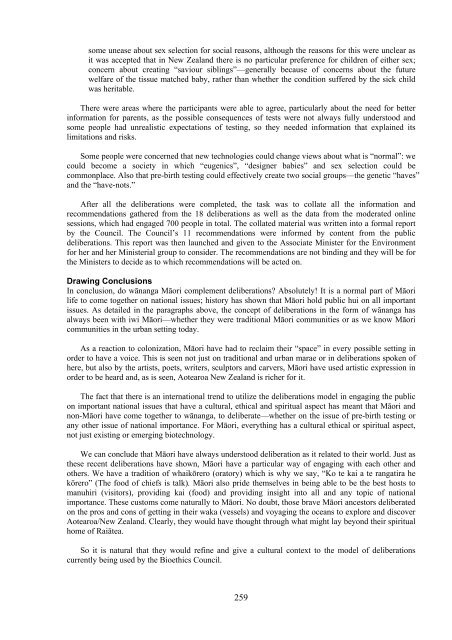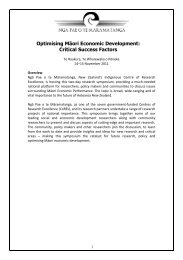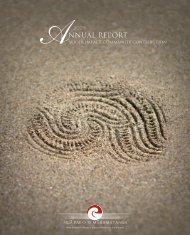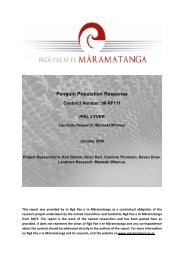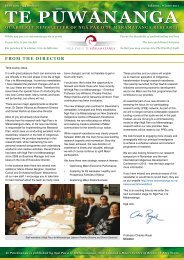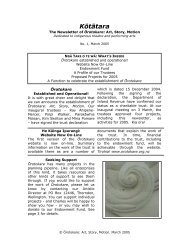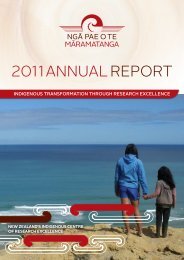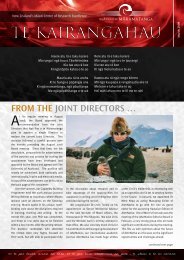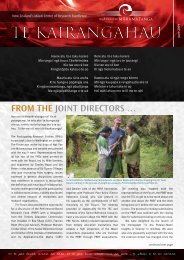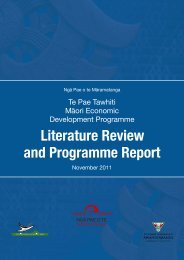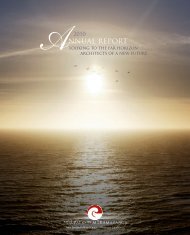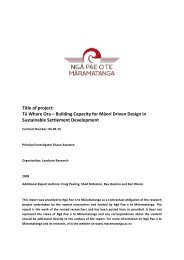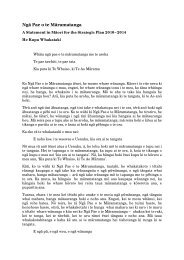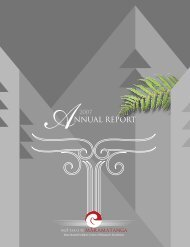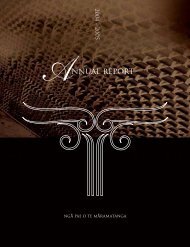traditional knowledge conference 2008 te tatau pounamu
traditional knowledge conference 2008 te tatau pounamu
traditional knowledge conference 2008 te tatau pounamu
You also want an ePaper? Increase the reach of your titles
YUMPU automatically turns print PDFs into web optimized ePapers that Google loves.
some unease about sex selection for social reasons, although the reasons for this were unclear asit was accep<strong>te</strong>d that in New Zealand there is no particular preference for children of either sex;concern about creating “saviour siblings”—generally because of concerns about the futurewelfare of the tissue matched baby, rather than whether the condition suffered by the sick childwas heritable.There were areas where the participants were able to agree, particularly about the need for bet<strong>te</strong>rinformation for parents, as the possible consequences of <strong>te</strong>sts were not always fully understood andsome people had unrealistic expectations of <strong>te</strong>sting, so they needed information that explained itslimitations and risks.Some people were concerned that new <strong>te</strong>chnologies could change views about what is “normal”: wecould become a society in which “eugenics”, “designer babies” and sex selection could becommonplace. Also that pre-birth <strong>te</strong>sting could effectively crea<strong>te</strong> two social groups—the genetic “haves”and the “have-nots.”Af<strong>te</strong>r all the deliberations were comple<strong>te</strong>d, the task was to colla<strong>te</strong> all the information andrecommendations gathered from the 18 deliberations as well as the data from the modera<strong>te</strong>d onlinesessions, which had engaged 700 people in total. The colla<strong>te</strong>d ma<strong>te</strong>rial was writ<strong>te</strong>n into a formal reportby the Council. The Council’s 11 recommendations were informed by con<strong>te</strong>nt from the publicdeliberations. This report was then launched and given to the Associa<strong>te</strong> Minis<strong>te</strong>r for the Environmentfor her and her Minis<strong>te</strong>rial group to consider. The recommendations are not binding and they will be forthe Minis<strong>te</strong>rs to decide as to which recommendations will be ac<strong>te</strong>d on.Drawing ConclusionsIn conclusion, do wānanga Māori complement deliberations? Absolu<strong>te</strong>ly! It is a normal part of Māorilife to come together on national issues; history has shown that Māori hold public hui on all importantissues. As detailed in the paragraphs above, the concept of deliberations in the form of wānanga hasalways been with iwi Māori—whether they were <strong>traditional</strong> Māori communities or as we know Māoricommunities in the urban setting today.As a reaction to colonization, Māori have had to reclaim their “space” in every possible setting inorder to have a voice. This is seen not just on <strong>traditional</strong> and urban marae or in deliberations spoken ofhere, but also by the artists, poets, wri<strong>te</strong>rs, sculptors and carvers, Māori have used artistic expression inorder to be heard and, as is seen, Ao<strong>te</strong>aroa New Zealand is richer for it.The fact that there is an in<strong>te</strong>rnational trend to utilize the deliberations model in engaging the publicon important national issues that have a cultural, ethical and spiritual aspect has meant that Māori andnon-Māori have come together to wānanga, to delibera<strong>te</strong>—whether on the issue of pre-birth <strong>te</strong>sting orany other issue of national importance. For Māori, everything has a cultural ethical or spiritual aspect,not just existing or emerging bio<strong>te</strong>chnology.We can conclude that Māori have always understood deliberation as it rela<strong>te</strong>d to their world. Just asthese recent deliberations have shown, Māori have a particular way of engaging with each other andothers. We have a tradition of whaikōrero (oratory) which is why we say, “Ko <strong>te</strong> kai a <strong>te</strong> rangatira hekōrero” (The food of chiefs is talk). Māori also pride themselves in being able to be the best hosts tomanuhiri (visitors), providing kai (food) and providing insight into all and any topic of nationalimportance. These customs come naturally to Māori. No doubt, those brave Māori ancestors delibera<strong>te</strong>don the pros and cons of getting in their waka (vessels) and voyaging the oceans to explore and discoverAo<strong>te</strong>aroa/New Zealand. Clearly, they would have thought through what might lay beyond their spiritualhome of Raiā<strong>te</strong>a.So it is natural that they would refine and give a cultural con<strong>te</strong>xt to the model of deliberationscurrently being used by the Bioethics Council.259


